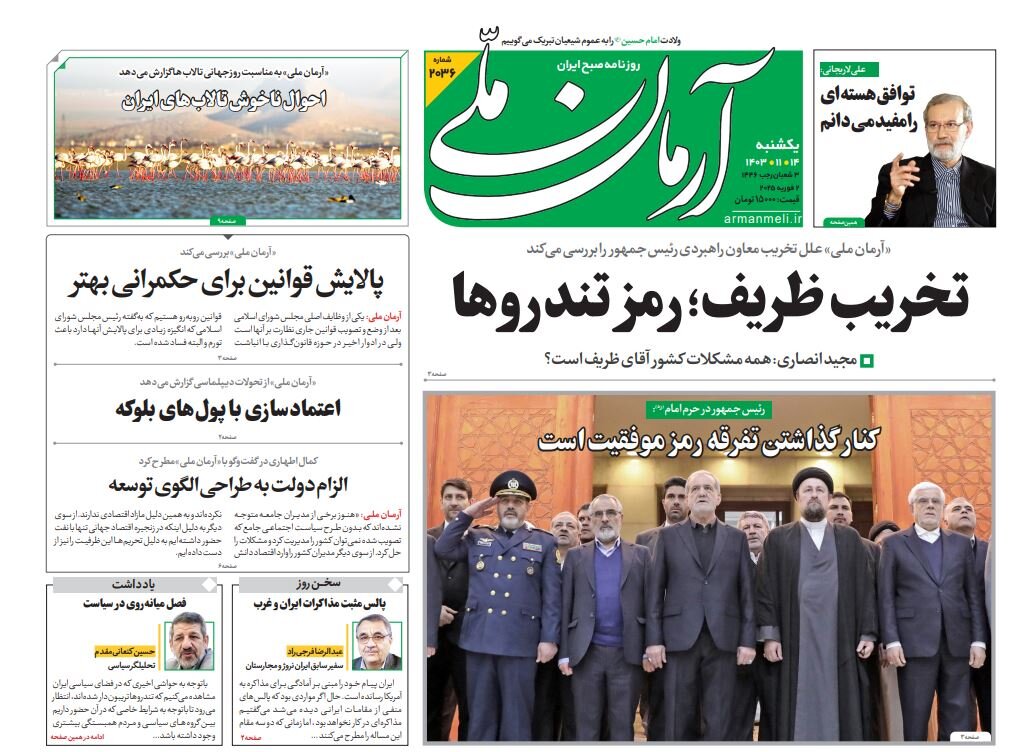Opportunity for direct negotiations with US

TEHRAN - In a commentary, Arman-e-Melli examined the possibility of direct negotiations between Iran and the United States to resolve the nuclear dispute.
It wrote: Almost a significant percentage of the society, analysts and experts acknowledge that the solution to the country's problems or a significant part of lie in negotiations, interaction, and international agreements; and the further we take this path, the more we can benefit from its results to solve the country's problems, especially the economic ones. Negotiations with the West are as important as negotiations with the East. For this reason, not long ago, the Iranian delegation went to Geneva for the second round of negotiations with the European troika. However, it seems that these negotiations will continue and the Americans will also enter the talks as conditions are ripe to reach a new agreement. However, some believe it has been proven that playing with the European card has not and will not have very positive or good results for Iran. It is better to put aside intermediaries and negotiate directly so that direct dialogue can take place without mediators to lift sanctions.
Etemad: The illusionary world of saboteurs
In an analysis, Etemad discussed Trump's move to freeze the $60 million budget for the foreign-based Iranian saboteurs and wrote: It is said that Trump disappointed and even undermined the saboteurs’ opposition to the Islamic Republic of Iran on the very first day of his presidency, saying that the U.S. government would no longer pay fund to them. The approximately $60 million that was given to the saboteurs, who claim they have a regime change project on their agenda, is frozen. It was clear to many that the saboteurs were being run with U.S. and Israeli funding. Trump's cutting of such funding shows that the saboteurs are facing a major problem. It has become clear that those who claimed to be independent and patriotic were neither independent nor nationalist. Trump destroyed the plans of the saboteurs. They thought that with the arrival of Trump and the Trump-Netanyahu alliance, the Islamic Republic's was finished. The opposition neither knows its origin nor has a clear vision of what it seeks. For them, illusion has become a way of life. Their method is a political struggle and appeals to America and Israel. But suddenly Trump upsets them.
Javan: Negotiating with an unknown imperialism!
Javan dedicated its headline to the issue of accepting America in the negotiation process and said: The imperialist nature of America has become more apparent today with Trump’s expansionist thinking. If we want to negotiate with America, it is not enough for governments to claim that they know America well. A successful negotiation is one in which the imperialist nature of America is explained to society. An Iranian agreement with America will not be an agreement between two governments, rather it will be an agreement between two countries. Its benefits or losses will accrue to both nations. If a true understanding of the imperialist nature of America, which has now become more apparent with Trump’s expansionist claims over other countries, is not achieved in case another incomprehensive agreement is reached with America, young Iranians will blame the failure on the Iranian government and even on Iranian culture and identity. Due to the absence of this complete understanding, the failure will be more catastrophic than failure in a negotiation.
Iran: A look at Washington's negotiation plan
In a commentary, the Iran newspaper discussed Washington's likely negotiation plan in a report carried out by the Economist. It said: The Economist's prediction regarding the structure of the Iran-U.S. agreement is based on unbalanced concessions and has very serious ambiguities. One of the ambiguities in the issue of concessions to be granted to Iran to normalize relations with Saudi Arabia, but this happened without the U.S. participation. One of these concessions would be for Iran to abandon its regional activities (support for resistance groups fighting Israel). Iran must first agree to negotiate regional issues. Given recent military developments, it appears that Iran's approach has shifted from cross-border deterrence to intra-border deterrence. This change in approach causes issues such as Palestine and Yemen to be considered national or local issues that require independent solutions. Furthermore, an agreement not to provide military support to the resistance groups in these countries requires a monitoring and verification mechanism that seems very difficult and almost impossible to achieve.
Leave a Comment